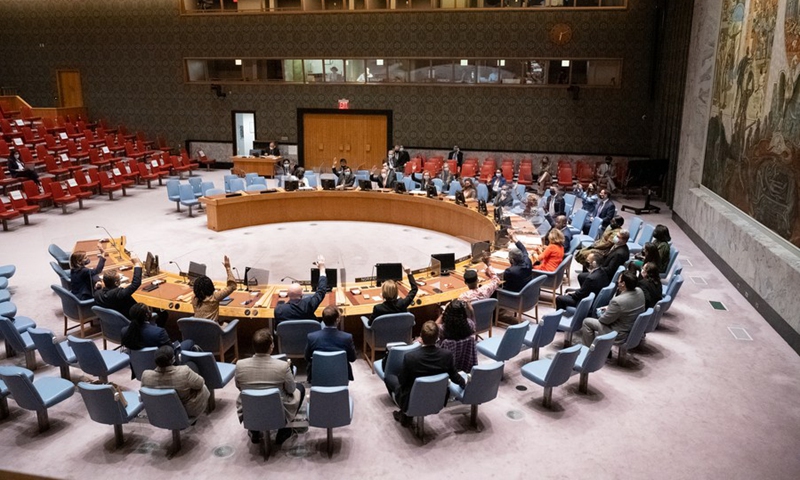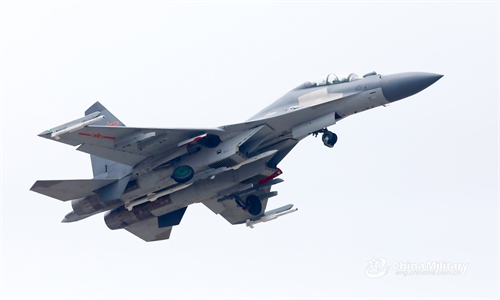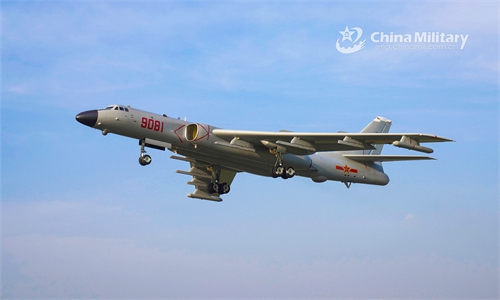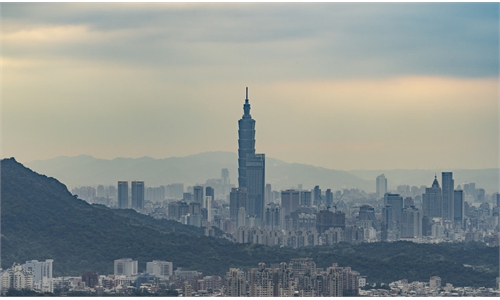‘One-China principle’ only route for Taiwan island to attend international events
Seeking ‘international space’ for secessionism will result in tougher retaliations

Representatives vote during a UN Security Council meeting at the UN headquarters in New York on October 15, 2021. (Photo: Xinhua)
As the Chinese mainland celebrated on Mondaythe 50th anniversary of the restoration of the People's Republic of China's (PRC’s) lawful seat in the United Nations (UN), Taiwan secessionist authorities and the US have used the occasion to hype the topic of “seeking international space” for the island of Taiwan to challenge the widely recognized “one-China principle” and provoke the PRC on the issue of sovereignty.
Fifty years ago, on October 25, 1971, the US failed to stop the international community from restoring the PRC’s lawful seat in the UN and had to accept the reality, so today and in the future, there is no hope for the US to overturn the long-existing hard fact and internationally recognized “one-China principle” to support Taiwan secessionism and challenge China’s sovereignty, said experts on Monday.
The more Washington and Taiwan secessionists provoke the Chinese mainland on the Taiwan question, the tougher the retaliation from the mainland will be and the sooner China’s national reunification will be realized, they noted. They suggested that if the Taiwan authorities really want to participate in some international events, the best and only correct way is to return to “the 1992 Consensus” and seek permission from Beijing, rather than seeking useless and insincere “support” from Washington.
Chinese Foreign Ministry spokesperson Wang Wenbin said at Monday’s routine press conference that when the Taiwan authorities call for support from foreign forces to expand their so-called international space, they actually seek to expand the space for secessionism, and is doomed to fail.
Wang’s remarks came after the US Department of State announced the latest move between the American Institute in Taiwan (AIT) and the Taipei Economic and Cultural Representative Office (TECRO) on Saturday.
According to the website of the US State Department, the organizations convened high-level representatives of the US Department of State and the island’s external affairs authority for a virtual forum on expanding “Taiwan’s participation at the UN and in other international fora.” The discussion focused on “supporting Taiwan’s ability to participate meaningfully at the UN and contribute its valuable expertise to address global challenges.”
Wang urged the US to scrupulously abide by the one-Chine principle and the three China-US joint communiqués, to stop interactions with the Taiwan Democratic Progressive Party (DPP) authority and to stop sending wrong messages to encourage Taiwan secessionism in any form, and not to do anything to harm China-US ties and the stability of the Taiwan Straits.
One-China principle
The “one-China principle” means that Taiwan is an inalienable part of China and the government of the PRC is the only legitimate government that represents China, so the only way for Taiwan to attend international events or join relevant international organizations is to follow the principle and as a part of China, said analysts.
In the past, before 2016, when the KMT authority ruled the island, Taiwan was able to attend some international activities or forums, such as the World Health Assembly (WHA), as a part of China with the permission of the PRC, said Li Fei, a professor with the Taiwan Research Institute at Xiamen University.
But after the DPP authority came to power in 2016, it started seeking secessionism by abandoning “the 1992 Consensus” that respects the “one-China principle,” the island of Taiwan has been banned from attending relevant international events or organizations which consist of sovereign states.
Li said although the US and some foreign forces always say they will support Taiwan in dealing with the ban, they have failed again and again, proving that the US does not have the strength to overturn the widely recognized “one-China principle” among the international community, and they can’t even stop some countries from abandoning diplomatic recognition of the Taiwan island and establishing formal diplomatic ties with the PRC.
Tang Wensheng, a former vice-chairperson of the All-China Federation of Returned Overseas Chinese, was an English interpreter who served in the Chinese Foreign Ministry 50 years ago and witnessed the historic moment of the restoration of the PRC’s lawful seat in the UN.
Tang told the Global Times on Monday that 50 years ago, although the US wanted to normalize and improve ties with the PRC but still keep the UN seat for Taiwan, the US attempt failed as the Chinese mainland firmly rejected the “two-China” arrangement.
As a result, 50 years later, when the PRC has become the second largest economy and a powerful major country in the world, there is absolutely no room for US and Taiwan secessionists to play any tricks to expand their space for secessionism or challenge China’s sovereignty, said experts.
No space for secessionism
The reason why the “one-China” principle has become so widely recognized among the international community is that most countries noticed that supporting Taiwan secessionism to challenge China’s sovereignty will seriously damage regional peace and stability, and will also encourage secessionism worldwide and undermine the sovereignty of other sovereign states, so any attempt to legitimize the Taiwan DPP authority’s secessionist demands is useless and pointless, as it goes against common sense and the consensus shared by the vast majority of the international community.
A Beijing-based expert on Taiwan affairs and international relations, who requested anonymity, told the Global Times that if the US really wants to expand the “international space” for Taiwan in a more provocative way, it needs to prepare for a new round of tensions with the Chinese mainland, which will bury any hopes for the recovery of China-US ties, something the Biden administration desperately needs, as the US is facing serious domestic and external challenges.




